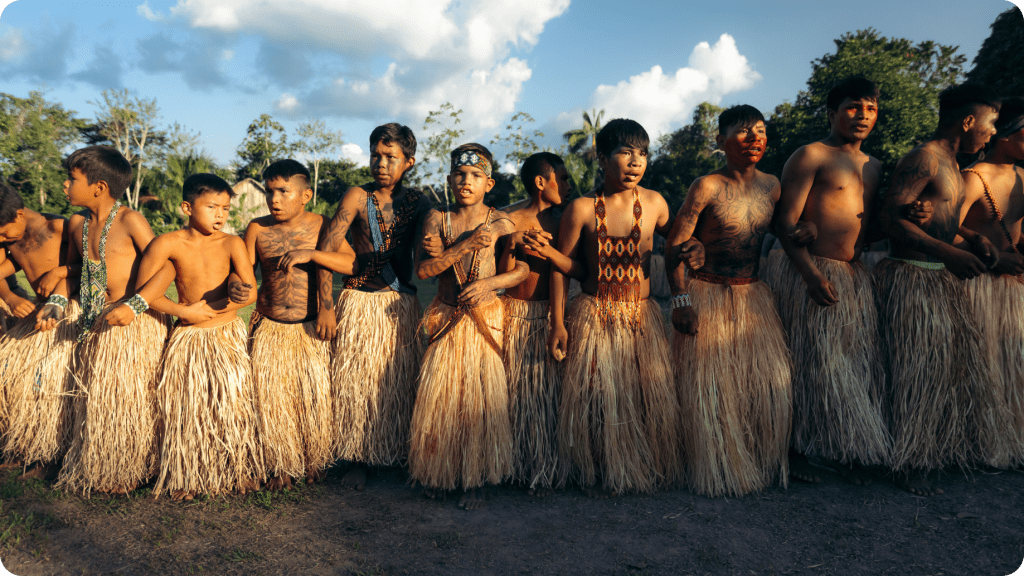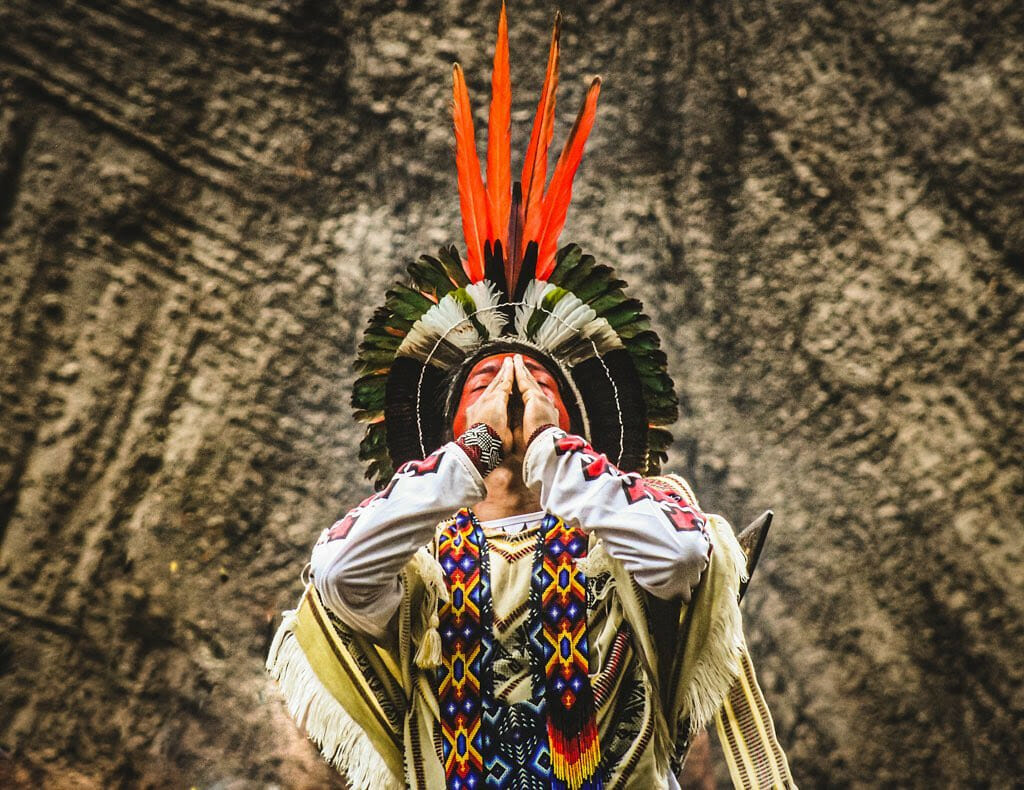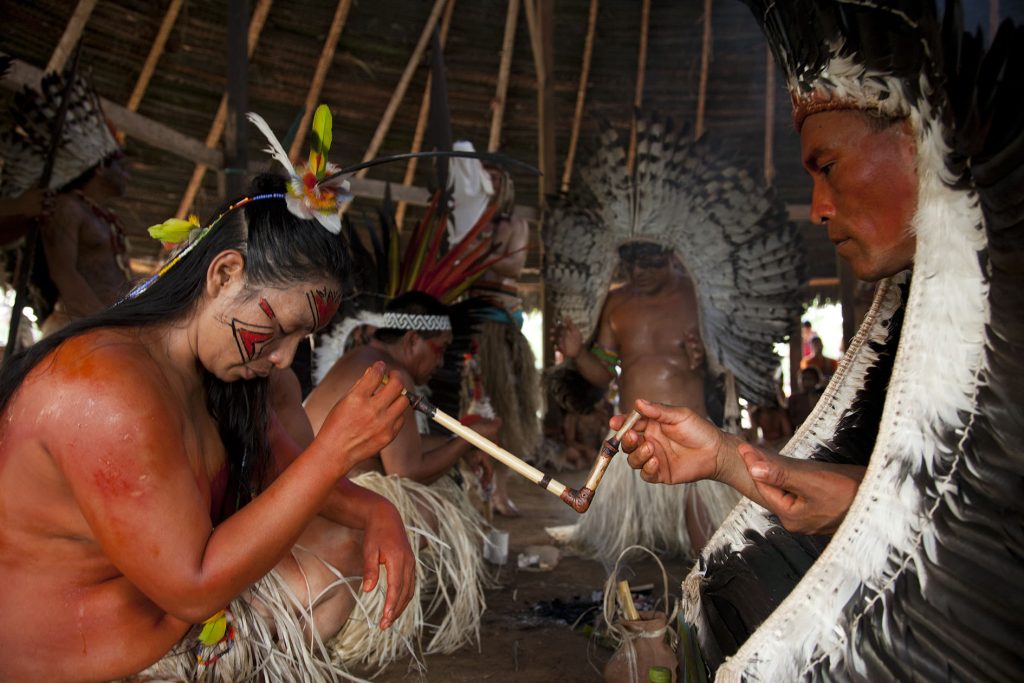Worldview and spirituality
The Yawanawá are communities that depend 100% on Nature. As they themselves say: “We live from hunting, fishing, and we make our homes and means of transportation. Our relationship is one of respect, harmony and reciprocity. Because what we take from the earth we give back” – Tashka Yawanawá, young leader of a Yawanawá village.

“We indigenous peoples who live in the jungle are in constant connection with spirituality, because the manifestation of the Creator is nature itself. So we listen and look every day. We are in full contact with spirituality. We perform a ceremony that is like a thank you to Mother Earth for everything she offers us, we sing our songs and we have our face paints” adds Tashka.
All their activities, their social and economic structure, are framed in a spiritual vision entirely related to the Jungle. “Our land is our home, our friend and comrade. We respect our land very much and we have the responsibility to take care of it.” A young Yawanawá says:
They, along with the rest of the indigenous Amazonian peoples, are responsible for taking care of the lungs of the Earth, the Amazon. For this reason, they maintain a relationship of connection and harmony with the jungle, which is reflected in their own clothing, headdresses made of macaw and harpy eagle feathers, in their tattoos with different pigments that imitate patterns of the jungle or its powerful animals. Also in their way of building and farming, always respecting the environment in which they live and integrating into it as another living being in their ecosystem.

When explaining their worldview, they speak of the “wakán”, which they translate as “soul” or “shadow”. The “wakán” constitutes the vital force of living beings; human beings, animals and plants. We can say, therefore, that the Yawanawá, as happens with the majority of Native Peoples, have an animistic conception of the world.
It is difficult to know if this is an original conception, or if perhaps it is influenced by almost three centuries of submission to Catholicism.
Likewise, they grant some entities extraordinary powers, deifying the moon, the sun, the stars, the rain, the snake, the jaguar; always governed by the omnipresent force of Mother Jungle, the “Forest”.
For the Yawanawá, dreams are extremely important; they are signs that tell us how we should act. It is common for decisions of great importance to be made based on “visionary” dreams of some member of the tribe (especially if it is the shaman).
In a TED talk, a young man from the Yawanawá people tells of his people’s worldview regarding sacred medicines: “We use sacred plants during ceremonies to communicate with the forest. With ayahuasca you can see what life is like, starting with yourself, you can glimpse your spirit, understand why you have come to this world, but to do so it is not enough to drink this drink, you also have to believe.” And he adds: “When a shaman goes to look for a plant to cure someone, he first tells the plant, I am going to use you to cure my people, if I didn’t say it it would not have an effect on its own.”
The Yawanawá are ancestral experts in the preparation and use of ayahuasca, a hallucinogenic drink that is made from the decoction of two plants that grow only in the Amazon and is one of the most powerful traditional medicines of the Amazonian peoples.
“Since ancient times,” the young man continues, “we have used rumê (a type of snuff made from the bark of the tsunú tree) as part of our tradition and culture. We normally use rumê during our sacred ceremonies with ayahuasca, which we call Uni.”
Bira Yawanawá
Biraci Brasil Nixiwaká, known to everyone as Bira, is around 60 years old, a political and spiritual leader of the Yawanawá, chief of the Sacred Village, and is an iconic figure not only for all members of the tribe, but for the indigenous movement of his country.
At 18 years old, Bira embarked on a political and social struggle for the conservation of territories and culture, expelling rubber tappers and missionaries from his territories.
Bira tells us his spiritual vision of the forest: “Just as Christians have the Bible and Muslims have the Koran, for the native peoples, the people of the forest, the indigenous people, that forest is our sacred Bible.”
Bira confessed that he admires science, that he recognizes the West for the advances in development and new technologies. But when it comes to sacred plants, to the knowledge that nature offers, the authorities are they, those who have lived for thousands of years in the largest tropical forest in the world.
“We, the indigenous peoples… know how to speak the language of birds, of trees, of fish. We know medicinal plants, sacred plants. We know the names of these plants. We could translate that for humanity.”
Bira says that he knows that the capitalist system will not stop, that cities will continue to advance, grow, and new needs will grow with them. “We have to build something parallel to that system, but without excluding the other. It is possible to use technology, participate in the economy and at the same time preserve the forest. Maintain our culture and live in peace in the village.” The task that the Amazonian peoples do to protect the forest is fundamental for humanity.
In this sense, the Yawanawá, especially the shamans who have traveled around the world, know very well the way of life in Western countries. They say that the spirits in Europe sleep. That is why there is much talk of awakening: We humans are responsible for awakening the spirits, of awakening each other, according to the Yawanawá worldview.
Therefore, they have taken on the mission of sharing their own medicine with the Western world. Their ceremonies may seem very massive in the Western world, but it is their way of giving more opportunities to more people for the essential act of remembering, of finding their own spirit, of awakening.


“I think that perhaps the Western world can learn from us to live a more harmonious life at peace with our environment, combining Yawanawá knowledge with Western ideas.” -Bira.
